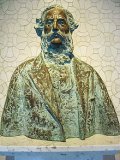
By:
Lucia Druetta, Assistant Editor, International Judicial Monitor and Director, Academic
Programs, International Judicial Academy
Carlos
Calvo was a prominent figure in international law of the late 19th century. The legal doctrine that he developed and that is named for him for its
time had a great influence on the development of the international law rules of
diplomatic protection, treatment of foreign people and goods, and state
responsibility in Latin American countries.
Calvo was
born in Montevideo (Uruguay) in 1824 and studied law in Buenos Aires, where he
eventually received Argentine citizenship. During his diplomatic career, he
represented Argentina and Paraguay before several European countries. It is
said that his ideas were influenced by the United States jurist Henry Wheaton,
and by a dispute between Paraguay and Great Britain in the 1860s. This event
took place when a Uruguayan-British citizen was accused of being involved in a
conspiracy to kill Francisco Solano Lopez, the son of a Paraguayan leader and
Vice-President of the country at the time. Following Paraguay’s refusal to free
the prisoner, Great Britain broke diplomatic relations with the country. On
behalf of Paraguay, Carlos Calvo became the diplomat in charge of rebuilding
the relations between the two countries, an endeavor in which he was successful.
Carlos
Calvo stood out as a grand legal scholar and historian. He authored many books on
international law, such as an International Law Handbook, Complete Collection
of Treaties, Conventions, etc. of Latin American States from 1493 until the
then present (1862-1869); the Dictionary of International Public and Private
Law (2 vol. 1885); and the Dictionary Handbook of Diplomacy and International
Public and Private Law (1885). However, his ‘Derecho Internacional Teorico y
Practico’ (International Law Theory and Practice - Buenos Aires edition,
1868 and French edition, 1896) became his most influential work and forms the
basis of the so-called ‘Calvo Doctrine’.
The Calvo
Doctrine was originally seen as a reaction from ‘weak’ states to the actions of
‘strong’ states. It

 International
Judicial Monitor
International
Judicial Monitor